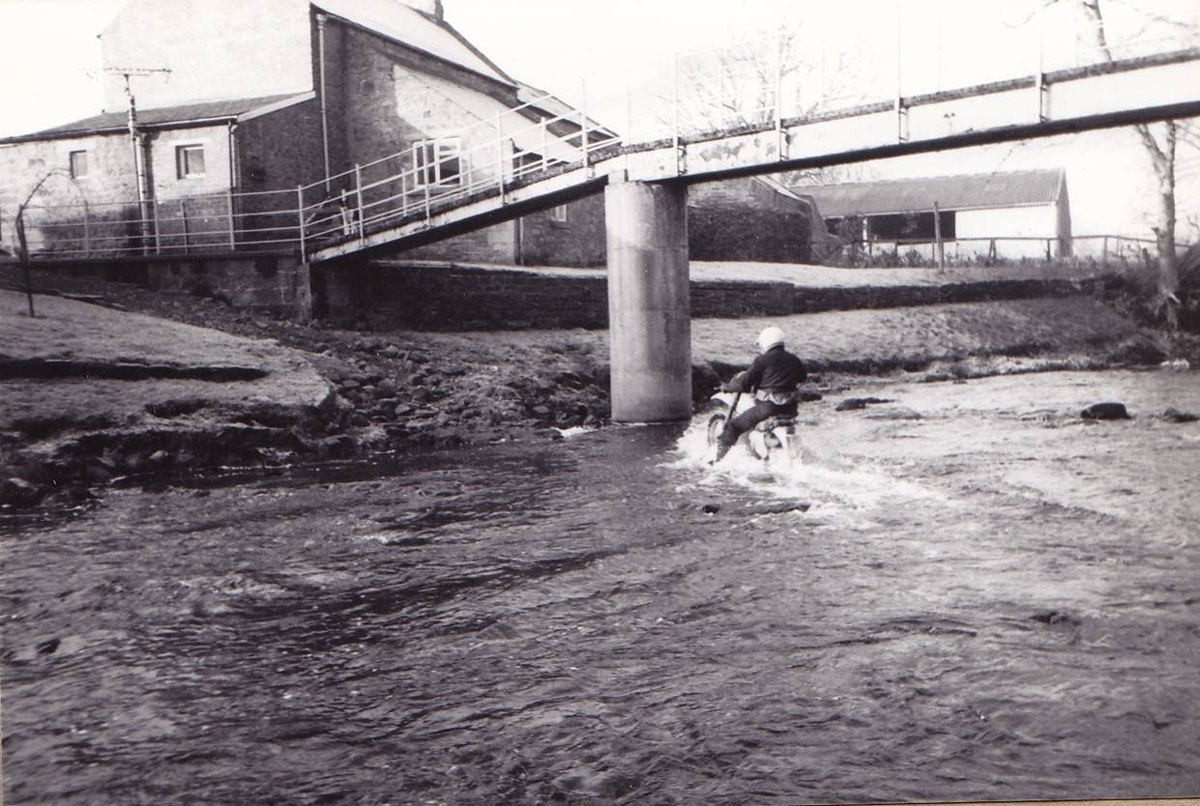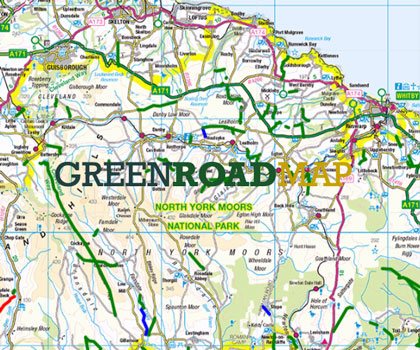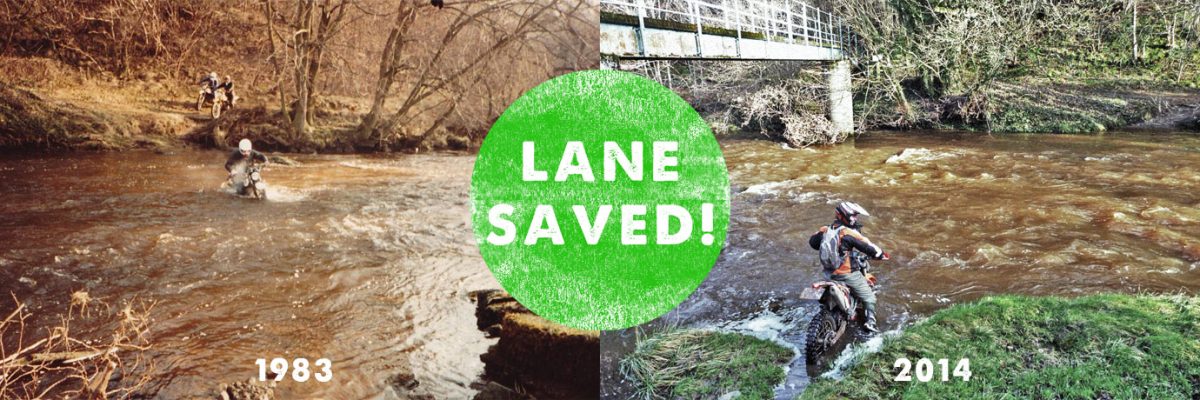
What does 'fighting for our green roads' actually mean? Respected public access advocate and lifetime TRF member Alan Kind has ridden almost every lane in the land, from the clubs origins in finding green roads right through to the current mission of conserving and protecting them. He is the man at the sharp end of the fight, using his legal expertise to challenge TRO's in and out of court. Recently he was instrumental in overturning a decision that would have seen River Green Mill, an iconic BOAT in Northumberland declassified to a restricted Byway. Here he describes what happened, how the TRF approach legal challenges and what every TRF member can do to help make sure we can access green roads long into the future.
TRF
Thanks for taking time out of your busy schedule Alan to talk to the TRF. Maybe we could start with a little background about yourself? .
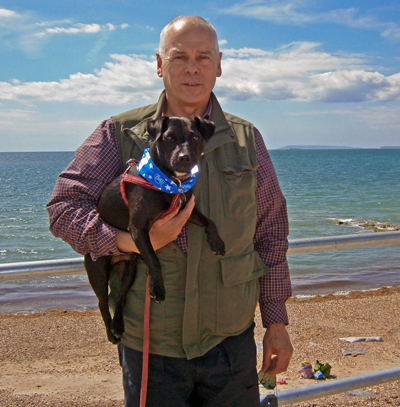
Alan
I started motorcycling on unmetalled roads in 1968 (age of 18) around Newbury and Marlborough, having recently gone to live there when my father was posted to a new job. One of my workmates lived at Ramsbury and the local ‘lads’ knew all the unmade roads, which were then very much part of everyday life. Ordinary cars like Morris Minors could cope with ruts rather well, and there was seldom a tractor bigger than a Ferguson to make ruts anyway.
RUPPs had been on OS maps for only about 5 years, and there were no BOATs.We used whatever bike we had for everyday use. I had a Royal Enfield GT Continental (flat bars replacing the clip-ons), with a ribbed front tyre, and yes, I did fall off in the ruts on the Ridgeway.
Mid-1970s and I was in Yorkshire, with a garage-full of semi-derelict Matchless singles. The Leeds chapter of the AJS/Matchless Owners’ Club was into greenlaning – I well remember using the currently contentious road between Twistleton Hall and Yordas Cave – and again these road were used because they were known to be public roads – not because they were on the definitive map.
I joined the TRF in late 1979 (memory tells me) and got a free pass to pay a year’s subs in 1980. This was the era of Brian Thompson, John Higgin, Richard Marshall, and others who were not necessarily TRF founders, but who came in shortly afterwards.
In 1983, tired of bending over a drawing board every day, I went to Newcastle University as a mature student (we got lovely big grants back then …) and got myself a Bachelor of Laws degree, followed a few years later by a Master’s. When I graduated in ’86 LARA was just being set up and, interestingly, the main driver behind it was opposition to stage rallying in the Welsh forests, rather than to trail riding. I got the ‘principal officer’ job in LARA and have had a version of it ever since apart from a few years in the late 1990s when I moved across to edit ‘Byway and Bridleway.’
What does LARA do? Everything from national-level committees and consultations, to local ‘little cases’ that matter. Look at our website. Ask your LARA representative. Our only limit is when the bank account is empty. But LARA is not just me by any means. We have had only four honorary chairmen in 29 years (two now sadly deceased), a lot of hard-working committee volunteers, and some excellent officers in Tim Stevens, Dave Tilbury and Dave Kersey.
TRF
Some TRF members rally around the phrase “fighting to keep our lanes open”, from your perspective, what does that actually mean?
Alan
That’s a rather emotive phrase, but it does have a degree of truth. Countryside access always has been a battle. That is the way it is. Britain may be the Land of the Free, but as soon as the ordinary man and woman start standing up for themselves, the establishment does not like it one bit.
There is so much involved in ‘keeping lanes open’, and it is not only the sharp end of court cases and public inquiries. It is also watching for what is sneaking round behind the bushes, being knowledgeable, truthful (i.e. when our people cause problems we do not go into denial), and as much as anything, ‘being there’ – having a presence, week after week, year after year. You earn respect and the TRF and LARA have.
What we cannot realistically do is stick up for objectively irresponsible behaviour: noise, speed, appearance, ground impact, etc. My view is that, unless prodded by a sharp stick, most people have little objection to the motorcyclist who blends in and passes by quietly and carefully. They do object to motoring that causes them annoyance or fear.
TRF
We won a case in Northumberland where a very popular Byway, River Green Mill, was due to lose its vehicular rights. Could you outline what happened and how you approached and won the case?
Alan
This was a case that I did for the TRF, rather than for LARA. Northumberland County Council has had a policy for over 20 years now of making orders to ‘convert’ unsealed unclassified roads to BOATs. I sometimes wonder if its primary purpose now is to keep the two excellent definitive map officers there in a job (and if so, can you blame them?) but of course where TRF people have used a road for 40 or more years, as soon as the A4 notice goes up saying ‘Byway’, all hell breaks loose.
NCC has records made for the Restriction of Ribbon Development Act 1935 which, taken with other highway records since 1929, generally show that the county’s ‘unsealed unclassified roads’ were always regarded as something more than mere footpaths or bridleways (there is a lengthy report on this on the LARA website if you are interested).
In this case (in which the TRF was not initially involved; simply, you cannot do them all) the Inspector decided that in her view the route was a bridleway and not a vehicular road. For administrative reasons this triggered an opportunity for the TRF to object to the Inspector’s findings, and we had a public hearing (a sort of informal inquiry) in February. To convince the Inspector that she was wrong, and that corn and flour traffic from the corn mill at Rivergreen was most probably by cart, demanded analysis of old maps, and extracts from an academic treatise on horse transport, both sides of the Black Death.
You are looking at 3 to 3.5 days of preparation and delivery work here, with a site visit that itself threw up important issues. We also had to analyse the evolution of council’s powers to erect footbridges as these evolved from the Highway Acts of 1835 through 1862, 1864 and into 1959. It is this detail that wins or loses cases.
TRF
What are the repercussions of the River Green Mill case?
Alan
Was Rivergreen Mill important? Well, if your are ‘fighting to save our lanes’ then they are all important. And – crucially – we got an outcome in the Inspector’s reasoning that is (I think) directly transferrable to two other similar cases, coming to further hearings in the summer, and to other cases, further afield.
This learning experience gets developed in the submissions in other cases, thereby giving the TRF considerable leverage on its investments.
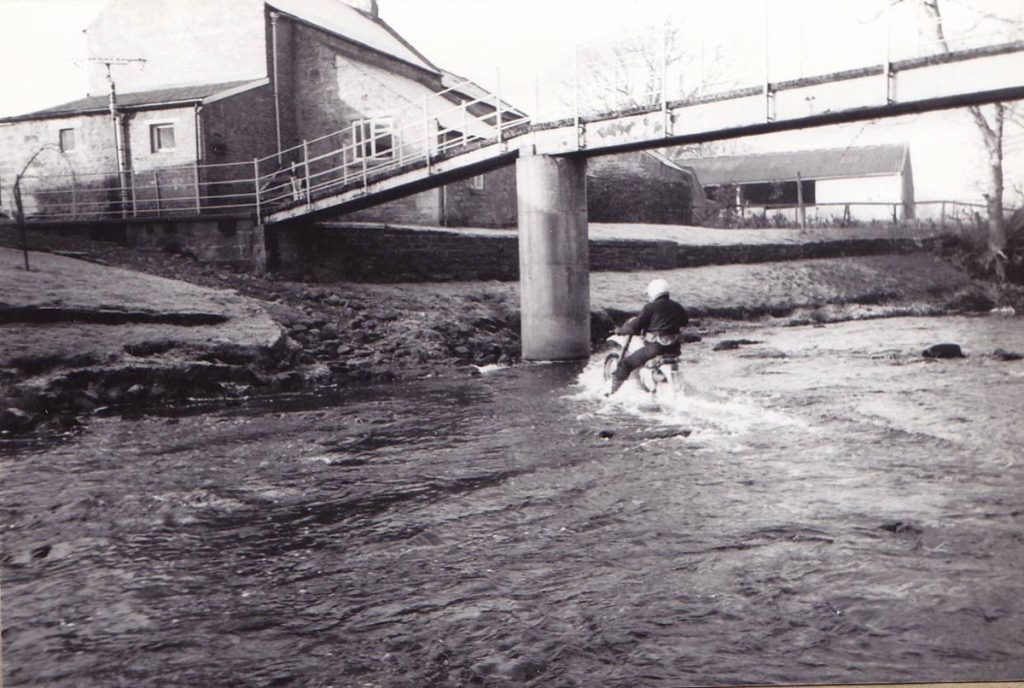
TRF
You have been active in ROW issues for many years. Do you think attitudes towards vehicles in the countryside are hardening or have they always been there? What does the future hold for trail riding in England and what part can the TRF and our members play in conserving green roads?
Alan
Things change and at the same time they stay the same. 25 years ago it was the Ramblers Association that was the primary anti-TRF outfit. They have mellowed a bit over time (possibly because the TRF sits at the same table quite often and talks about the same things). Then we had GLEAM, and now GLPG, both of which in my view were driven by the money of landowning interests opposing changes to the definitive map triggered by the TRF’s hard work and increasing professionalism. Money talks and money does not want rights of way through its estates. For a while byway ‘claims’ were numerically significant, simply because the TRF was doing the research. For every action there is an equal and opposite reaction. As we got better we taught the opposition and they ratcheted things up in turn. That’s they way it is in most areas of life.
Peak Horse Power is another vociferous organisation who for whatever reasons want all recreational motors off all unsealed roads (particularly in the Peak District). The situation there is, I believe, not as bad as PHP makes out, with theatrical weeping in public inquiries, and local grannies programmed to denounce ‘recreational vehicles’ (would your granny ever use the term ‘recreational vehicle’ unless primed?) but, I think, not quite as benign as the TRF would wish.
However various Stakeholder Working Groups and consultations have repeatedly concluded that whilst there might be a minority of local issues that need management that there is no widespread problem to be addressed.
The TRF and organisations like it welcome the opportunity to engage with authorities and other user groups to deliver inclusive solutions where they are needed.
Trail riders themselves have a role to play riding considerately and sharing the trails in a responsible and sustainable way so that everyone can enjoy the amazing countryside we have around us.

